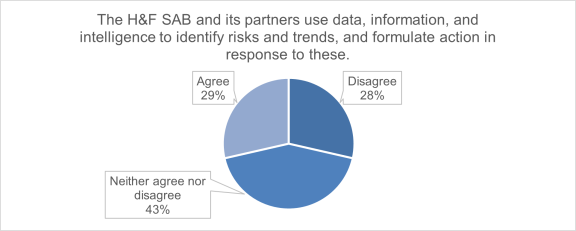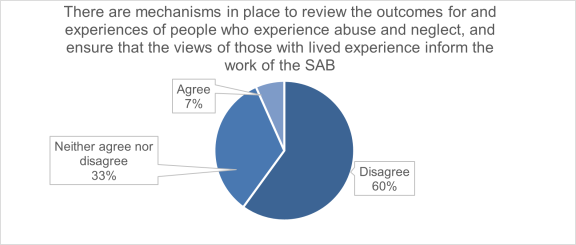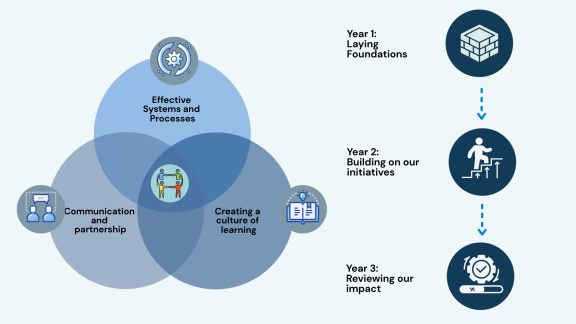Coordination of multi-agency responses in complex cases
Annual report for 2023-24
Foreword
The Care Act 2014 states that every local authority must have a Safeguarding Adults Board (SAB). The SAB is a partnership of organisations working together to prevent abuse and neglect of adults in need of care and support.
If someone experiences such behaviour, board members must respond in a way that supports the person’s choices and aids their wellbeing. Every SAB is required to produce an annual report listing its activities, progress, and achievements.
The act also requires a SAB to undertake a Safeguarding Adults Review (SAR) when an adult with care and support needs has died or suffered serious harm, and it is suspected or known that the cause was abuse or neglect (including self-neglect) and there is concern that agencies could have worked more effectively to protect them.
Over the past year, the SAB has concluded 2 SARs - Alison and Brian. The report details the circumstances of Brian and examines the themes and the response to the learning emerging from the case. Alison was discussed in last year’s report but time scales precluded an in-depth consideration of the learning from the case.
Alison died in a house fire. The SAB has overseen a multi-agency response to fire prevention within dwellings, led by our Borough Commander for London Fire Brigade and his colleagues. This work is covered in some detail within the report. Our work has been recognised as best practice and created interest both in London and across the country. The work of the local fire brigade was recognised when they won a Partnership Champions award.
The report mentions the latest SAR commissioned in March, presently known as Adult ’C,’ which concerns an attempted suicide. Adult ’C’ and his family will be fully involved in the review and this will be covered in more detail in next year’s report.
The annual report outlines progress against our strategic plan, launched in the spring of 2023. Progress is summarised in the animation included in the report. These include our response to self-neglect, a new policy for persons in positions of trust, work to increase our understanding of discriminatory abuse and the application of the Mental Capacity Act which together with other themes are all explored in more detail in the report.
Despite this progress, the report outlines areas where we were not so successful. Effective and regular training of staff and volunteers in their safeguarding responsibilities and obligations is vital to the work of the SAB. We are still seeking assurances that this training is provided and reflects the experiences of the individual as per Making Safeguarding Personal rather than just relying upon theoretical practice.
We also need to increase the engagement of the SAB with local voluntary and community groups. This will be achieved through more dialogue with, and participation in, existing networks and forums organised not only by the council but the third sector. The SAB is seeking to increase direct engagement through specific listening events and attending neighbourhood meetings.
Crucial to the success of the board, has been the drive, industry and perseverance of our board manager, Ceri Gordon. Ceri has written the report and is central to everything that the board has achieved since her appointment 2 years ago. I thank her for her commitment and enthusiasm.
I am retiring after 6 years as the chair and I would like to thank all the board members, past and present, for their support, help, advice, and participation. I have enjoyed working in Hammersmith & Fulham.
I wish my successor, Fiona Bateman, well as she becomes the chair of the SAB.

Mike Howard
Chair of the Hammersmith & Fulham Safeguarding Adults Board
June 2024
Safeguarding Adults in Hammersmith & Fulham
Safeguarding adults is about protecting someone’s right to live in safety, free from abuse and neglect. It is also about preventing the abuse of adults who might be unable to protect themselves because of their disabilities or care needs. We all have a role to play.
When the local authority receives an adult safeguarding concern, it is required to make enquiries, or cause others to do so, if it believes that an adult with care or support needs is experiencing, or is at risk of, abuse or neglect (Section 42, Care Act 2014). The enquiry process (Section 42.2) aims to determine whether abuse or neglect has happened and put plans in place to protect the adult from future harm.
If there is concern about an adult at immediate risk of harm, actions will be taken very quickly to protect the adult at risk of abuse or neglect and anyone else who may also be at risk. The process is a supportive one which seeks to work with the person at risk of harm to achieve personalised outcomes.
We have produced a focused report which contains an overview of how abuse and neglect presents itself in our borough and information about the use of Section 42 safeguarding enquiries.
If you have reason to believe that an adult with care and support needs is being harmed in any way, by another person please do not ignore it.
In an emergency, or if you suspect you or someone else is in immediate danger, call 999.
If you do not need immediate help from the police or are worried about calling them, you can contact H&F Adult Social Care (ASC) on freephone 0800 145 6095. This phone line is open 8am to 6pm, Monday to Friday. Outside of these hours you can call 020 8748 8588. You can also email the adult safeguarding hub at safeguardingadults@lbhf.gov.uk
Find out more about raising adult safeguarding concerns in H&F.
Safeguarding Adults Reviews
The SAB has a statutory responsibility under Section 44 of the Care Act 2014 to arrange for a Safeguarding Adults Review (SAR) to take place when an adult with care and support needs has died or suffered serious harm, and it is suspected or known that the cause was neglect or abuse (including self-neglect) and there is concern that agencies could have worked better to protect the adult.
SARs focus on capturing learning and their main purpose is to establish if we can learn anything about the way different organisations worked together to support and protect the person who suffered harm. This could identify barriers, but it could also identify good practice. This learning is then used to drive forward improvements to help us make positive changes to the way we work.
The Safeguarding Adults Case Review Group (SACRG - chaired by Parminder Sahota, Director of Safeguarding Children and Adults, West London NHS Trust and Mark Staples, Detective Chief Inspector, the local police public protection lead officer), plays a key role in reviewing information about potential SARs and monitoring responses to any learning identified from review processes.
In 2023-24, the H&F SAB concluded 2 Safeguarding Adults Reviews. These were the first SARs to be completed in our borough, and the conclusion of these processes has allowed us to reflect on our own role in ensuring SARs we commission produce timely and useful learning.
As part of this, the SACRG has recently reviewed our SAR referral form to include clearer guidance on required information. We are in the process of drafting a local SAR policy document to ensure that there is clarity of process and expectations for the borough. In addition to the referral and decision-making checklists created last year, the SACRG have also developed new checklists to guide commissioning processes and review of final reports.
Brian
A Safeguarding Adults Review was commissioned in September 2022 to consider how partner agencies worked together to support an individual we have called ‘Brian’. Brian was a 50-year-old army veteran who experienced adverse physical and mental health issues, and substance misuse. He had also experienced homelessness and had spent time in and out of prison.
Brian was known to a wide range of agencies who had varying levels of interaction with him. Some agencies had a good relationship with Brian and worked hard to find ways in which to support him. At times however, working with Brian could be a challenge, and used abusive and racist behaviour towards staff who were trying to support him.
In February 2022 Brian attended hospital following a physical assault, he received a head scan and was discharged home. Five days later, following concerns raised by his tuberculosis nurse, police attended Brian’s property and sadly found his dead body.
The review into the circumstances leading up to Brian’s death was concluded in September 2023, and provided new learning for consideration by the SAB.
What we've learned
Recognising the impact on staff
Understanding the impact of alcohol and substance use on mental capacity
Coordinated approach to multi-agency working
This review has highlighted the importance of seeking to work in a joint and coordinated way.
Effective multi-agency working can be enhanced by establishing a lead professional to coordinate discussions and action planning. It is also important to be aware of when it is appropriate to escalate concerns, either via management routes or to multi-agency panels such as the High-Risk Panel.
Recognition of the impact on staff
The review also highlighted the need to recognise the impact on workers who work with people with complex needs and who exhibit racist behaviour, and the effect upon workers when a client dies. The SAB is exploring how we can respond to this important issue.
Application of the Mental Capacity Act
This review drew attention to competence in assessing the mental capacity of people who use alcohol and, or substances and for people with fluctuating mental capacity. It highlighted the need for clear evidence-based recording of determinations of mental capacity (as described with SAR Alison discussed in detail later in the report).
Another feature that reinforces the learning from SAR Alison is a person’s right to make what are deemed as ‘unwise decisions’. This can create difficult situations for professionals who may be unsure of how to respond when someone is refusing the essential support they need, and they are deemed as having capacity to make that decision. SARs from elsewhere in London have pointed out that whether a person is capacitated or not regarding a specific decision should not be the end of the assessment or closure of any risk assessment processes.
Alison
We reported on the key learning from SAR Alison and the initial responses of the H&F SAB and its partners in our previous annual report.
Since then, we have continued to work on ensuring effective responses to the recommendations made within this report (see section Our response to learning).
Frank
In July 2023 the SACRG reviewed information relating to another fire fatality in the borough to determine whether this met the criteria for a SAR (Section 44). This involved a gentleman who we have referred to as ‘Frank’, who sadly passed away in September 2022 due to burns from an accidental fire in his home caused by smoking material.
It was felt that whilst there were many similarities to SAR Alison, there were no immediate concerns around the way agencies worked together. It was agreed that the case did not meet the criteria for a statutory SAR, but that a piece of work should be undertaken to identify similarities with SAR Alison and capture new areas of learning.
A review of the information provided by partner agencies was undertaken by the H&F SAB Manager, which primarily considered events between September 2021 and Frank’s death in September 2022.
Find out more about Frank’s story, and the key learning from this case – including examples of good practice.
Our responses to learning
All learning from Safeguarding Adults Reviews in H&F have been built into a thematic action plan, built around the key themes and prominent features of SARs identified within the first national analysis of SARs.
Direct Work
Interagency working
Organisational features
SAB governance
This has allowed us to identify similar learning from different SARs more easily, and group themed action points to focus our responses.
As we move forward, and receive recommendations as part of future SAR processes, this themed action plan will also allow us the opportunity to review our responses to any completed actions where there is overlap. We will also be reviewing these themes alongside any emerging areas that arise from the second national analysis of SARs, once published.
Awareness of home fire safety
The SAR for Alison included the recommendation that all multi-agency partners ensure that fire risks in the home and ways to mitigate them are included in practitioner or staff training, and that there are direct routes for all agencies to refer to London Fire Brigade (LFB).
A great deal of work has been done locally in H&F on home fire safety, with many actions put in motion before the conclusion of the SAR for Alison. Since the publication of the report, LFB has launched a new London-wide referral system allowing professionals who work or engage with very high-risk people to make urgent referrals for a home fire safety visit.
The LFB categorise an individual as being very high risk if they have all of the following 6 characteristics:
- smoker
- living alone
- over 60 years old
- in receipt of care (informal, formal or both)
- no working smoke alarms in their home
- they use mobility aids or are chair or bed-bound
This new referral route allows for high-risk concerns to be addressed within 4 hours, with a route to assess risk levels in other cases.
This new referral pathway has been promoted via the new H&F SAB home fire safety guide for professionals and a range of different internal communications used by partners.
NHS North West London (Integrated Care Board) are also looking to add prompts to this new referral pathway to the clinical systems used within primary care. The H&F SAB has also produced a short video guide on home fire safety, which refers people to the LFB website as an alternative referral route. This work has been promoted nationally by our SAB Chair.
Partner agencies have also responded to this recommendation in a range of ways via the delivery of workshops in conjunction with London Fire Brigade and dissemination of flyers, leaflets, and other resources (see previous annual report for more detail).
NHS North West London have recommended that the national e-learning system used by NHS include domestic fire risk as a module; this is currently under review. Colleagues from the H&F Fire Safety team have also delivered regular training to Adult Social Care staff on person-centred fire risk assessments, which are included in all social care assessments as standard.
Imperial College Healthcare Trust has also ensured that all relevant training and information is published on internal intranet pages, ensuring access for staff, with specific communication also made to the pharmacy team.
H&F SAB also chose home fire safety as the focus for our first multi-agency workshop. Led by Jim Berry (Station Manager, London Fire Brigade), this interactive virtual workshop was developed to help practitioners to explore responses to fire risk using Frank’s case to guide participants through the developing risk and share reflections on possible responses. This incorporated the learning from the SAR for Alison, in addition to other relevant learning from elsewhere in London, and was delivered on 27 February 2024.
In total 43 people attended the workshop, with attendees from a range of organisations, including local health providers, primary care services and domiciliary care providers. Feedback at the time of the workshop was positive, and initial feedback received has reflected this:

"Thanks for the very informative presentation”
“I learned about the process on how to assess and manage the situation and shared ideas with the wider partnership team"
This workshop will be repeated in the coming year to reach as many people professionals working in the borough as possible. The workshop has also helped highlight areas for the SAB to consider as a future area of work. Many attendees were unaware of new LFB professional referral system for high-risk cases, highlighting the need for further action. Participants were also asked to identify any challenges they faced in addressing home fire safety risks, and highlighted non-compliance, MCA application and referral mechanisms. This will be built into any future workshops and/or learning materials.
The H&F Commissioning team also have fire safety as a standing item in monthly contract monitoring. Updates from the LFB are shared with all known providers registered in the borough. LFB has attended an event for carers, and commissioners have shared the training emails with branch managers and encourage all carers to report any concerns or increased risks. The H&F SAB is considering whether a separate action is required around working with short-term providers who are not subject to same level of contract monitoring. LBHF Housing have also recruited two new Safety-First officers who are currently undertaking inspections and completing Person-Centred Fire Risk Assessments with onward referrals to LFB as necessary, working closely with ASC and LFB colleagues.
It has also been recognised that there are overlaps with learning from neighbouring SABs, and H&F’s Borough Commander for LFB has reached out to colleagues to explore how we can work together, considering use of existing examples such as the Hampshire SAB model for multi-agency framework for fire risk.
However, for some partners, evidence of efforts to raise awareness of home fire safety is less established. Responses to recent assurance exercise on training provision found that there was still reference to fire marshal training in one case, highlighting the issues raised in SAR Alison that staff training too often focused on fire safety awareness in the workplace rather than in the home setting. This has highlighted that there are still some gaps in this training for provision within agencies where staff may be visiting people in their homes.
Multi-agency working
Both SAR Alison and SAR Brian had recommendations that focused on improving multi-agency responses to risk. This included specific recommendations that the SAB promote best practice for multi-disciplinary working and guidance on responding to areas of complexity, with review of the scope of the High-Risk Panel.
A review of the Terms of Reference for High-Risk Panel was concluded in September 2023, and this has led to expansion of the scope of the panel to explicitly include unwillingness or inability to tend to personal care, health and living conditions, and ongoing needs or behaviour which places a person at significant risk.
A range of new promotional materials and resources have been created to support the promotion of multi-agency approaches and the use of escalation.
For example:
- the H&F SAB Home Fire Safety booklet includes notes on sharing the risk, considering referrals to High-Risk Panel, and reminder to ensure that all multi-agency meetings, decision-making and escalation processes are formally documented
- our Home Fire Safety video, which promotes multi-agency response and use of High-Risk Panel in complex cases
- new H&F self-neglect guidance, which includes best practice guidance for multi-agency working and templates to support practice (for example, meeting templates, process maps, and new risk assessment template)
These have been promoted via the H&F SAB newsletter and via single agency internal communication routes, however we recognise the need for more exploration of the different methods available to promote these new resources and SAB expectations, with an agreement on how we will review impact.
The planned multi-agency self-neglect audit will also consider multi-disciplinary working and seek assurance that such discussions and decision making is clearly recorded (see below for more details on this audit).
Application of Mental Capacity Act
In addition to specific recommendations around understanding of mental capacity and home fire safety within SAR Alison, SAR Brian made the recommendation that a training package be developed or commissioned to improve practitioners' understanding of the application of the Mental Capacity Act, with a focus on the assessment of mental capacity for people who use alcohol and substances, and for people whose mental capacity fluctuates.
This recommendation was recently discussed by the Safeguarding Adult Case Review Group (SACRG), who reflected on the need for a new approach, that is not focused on delivery of more classroom training. It is the H&F SAB’s expectation that staff should already have access to mandatory MCA training within organisations and that assurance be provided on this, and so commissioning of more direct training is not necessarily the answer. Instead, we will seek to develop reflective learning sessions using case studies centred on areas of complexity, as a complementary offer to existing training. This links to our wider plans to develop more learning opportunities for staff based on H&F SAR learning.
We will also seek to make better use of existing resources, such as those produced by Alcohol Change UK.
This includes:
- How to use legal powers to safeguard highly vulnerable dependent drinkers
- Learning from tragedies: an analysis of alcohol-related Safeguarding Adult Reviews published in 2017)
Resources such as this are also referenced in the newly published multi-agency self-neglect guidance, which also provides guidance on the application of the Mental Capacity Act in self-neglect cases with reference to executive capacity and fluctuating capacity. This new guidance also prompts consideration on inherent jurisdiction in response to separate recommendation from SAR Brian that the H&F SAB seek to raise awareness in this area, and we will continue to consider how we can incorporate this into future resources or learning opportunities.
Both SAR Alison and SAR Brian discussed the need to ensure that there are clear evidence-based recording of determinations of a person’s mental capacity. As part of our response to this observation, our first multi-agency self-neglect audit will also look to consider use of MCA and clear evidence-based recordings.
Support for staff
SAR Brian reflected on the difficulty staff faced in engaging with Brian, who could often be abusive towards them, including racist abuse. It was recommended that the H&F SAB and its partner agencies review local policy and processes for challenging racism and abuse towards staff to ensure there is a shared understanding of how such challenging cases will be approached and that agencies recognise the impact on workers who experience trauma in the course of their work and make provision for supporting practitioners through existing wellbeing services.
The SACRG have reflected on the pressure on staff to ensure duty of care is met whilst experiencing abuse, and the importance of encouraging staff to report such issues as soon as they arise so that they can be supported, and issues addressed with the adult. Feedback has also been gathered from SAB Members on how they support staff responding to challenging cases, which provided reflection on participation in multi-disciplinary panels or teams, and access to expert advice from senior management and safeguarding leads within organisations.
Moving forward, the SACRG have agreed an approach to these recommendations that includes review of existing policies and procedures, use of supervision and access to wellbeing services and specialist support as appropriate. The next steps will include creation of a template to gather more detailed information from partners on these areas, which may inform future action plans. This piece of work will include commissioners, to ensure that those working for provider services are also supported, in recognition that care workers may be at risk of experiencing this abuse. Whilst this outline for our planned response is in place, we have not yet embarked on this piece of work, and this will need to be a priority for 2024/25.
In term of direct practice, SAR Brian also recommended that the SAB develop and disseminate learning resources and guidance to support frontline workers and enable them to be sufficiently skilled and confident to effectively work with people who are difficult to engage, and to develop plans to increase understanding and application of the principles of intersectionality and trauma informed practice as part of this work.
The Quality in Practice subgroup (chaired by Helena Peros, H&F Designated Professional Safeguarding Adults, North West London NHS ICB and Liz Odigie Senior Operations Manager H&F Drug and Alcohol Wellbeing Service) have also supported responses to these recommendations via development of new resources to support practice. The recently published multi-agency self-neglect guidance sought to provide guidance to staff on how to approach self-neglect cases and promote multi-agency responses to areas of complexity. We have also recently launched a new learning tool focused on discriminatory abuse framework which promotes principles of intersectionality and encourages practitioners to reflect on their own biases. Access to external learning opportunities on trauma informed practice have also been shared via the H&F SAB newsletter.
Professional curiosity
Learning from Frank’s case also highlighted the importance of professional curiosity, and this has been identified as a key theme in the development of future multi-agency learning resources, with proposal that this includes co-development with team managers to consider the role of supervision in supporting reflective practice, and possible prompt questions and templates for recording. We hope to make this a focus of a future multi-agency workshop.
Individual agency recommendations
The H&F SAB also maintains oversight of responses to individual agency recommendations. To find out more about how partners have responded to named recommendations, please download our summary report (coming soon).
Newly commissioned Safeguarding Adults Reviews
In March 2024, the H&F SAB commissioned our third statutory SAR. This SAR focuses on an individual who is currently referred to as ‘Adult C’, a young man in receipt of support in relation to learning disability and mental health needs who in September 2023 sustained significant injuries following an attempted suicide.
Adult C's case was referred to the Safeguarding Adults Case Review Group (SACRG) by Adult Social Care (ASC) colleagues following an audit of records which identified potential learning in relation to pathways of support where multiple health and social care services are involved, information sharing and timeliness in assessment and support provision.
The SACRG and SAR Panel have agreed that the review process should include assessment of available systems and pathways, application of Making Safeguarding Person including consideration of cultural humility, and utilisation of a 'Think Family' approach.
Initial timeframes indicate that this SAR should be concluded by end of September 2024.
As we move forward with this SAR process, we hope to ensure full involvement of Adult C and his family, and will continue to consider how we can take a proactive approach to any emerging learning points.
Our progress against our strategic plan
Our new strategic plan launched at the beginning of 2023-24, identifying our key priorities and objectives as a partnership. Our focus has been on:
- establishing effective systems and processes
- creating a culture of learning
- strengthening communication and partnership
We have achieved a lot in the past year but recognise the need to keep moving forward to ensure that we are meeting all our aims.
Effective systems and processes
We will use an evidence-based approach to develop our responses to potential abuse and neglect and areas of complexity.
Improving responses to self-neglect
Self-neglect is one of the leading areas of concern for adults at risk in our borough. This year the SAB set out to improve our response to, and understanding of, self-neglect by undertaking greater analysis of the ways in which self-neglect presents in Hammersmith & Fulham. In responses to this objective, the Quality in Practice Subgroup have developed a new audit tool to analyse responses to self-neglect in the borough and are currently in the process of completing our first multi-agency audit. This audit process involves examination of agency records and capture the views of frontline staff.
It will seek to determine how indicators of self-neglect have been identified and responded to, including use of risk assessment tools and exploration of the person’s history to inform decision making, plan intervention and support the adult at risk. The audit will also examine the effectiveness of multi-agency working and utilisation of escalation processes, as well as application of the Mental Capacity Act.
We also wanted to consider options for earlier interventions and support. As a starting point for this work, we have created a new multi-agency guidance for responding to self-neglect. This guidance promotes the importance of planning our engagement with adults at the beginning of any assessment, ensuring sensitive approaches to identifying the person's capabilities and level of risk. We have also recognised the need to continue promoting the importance of professional curiosity, ensuring professionals are cautious; do not accept the first, and potentially superficial response given, but explore more deeply how a person understands and could act on their situation. This will be a continued focus of us as we move into the next year and start to build on progress to date (see below, creating a culture of learning).
Persons in Positions of Trust Policy
As we mentioned in our last annual report, a review of the SAB’s compliance with the Care Act statutory guidance, highlighted the need to develop a local framework for responding to allegations against Persons in Positions of Trust (PiPOT). Following input from a dedicated task and finish group, new guidance on how to deal with PiPOT allegations and SAB expectations was published in July 2023. The main guidance has also been complemented by new risk management template and a simple guide to expected process.
Ensuring this guidance was in place was a key measurement for our success last year, and so we are pleased to have produced an accessible document to support partners working with adults at risk in our borough. We are now looking at ways to build assurance mechanisms into regular reporting to the SAB.
Understanding responses to discriminatory abuse
Nationally, the low numbers of safeguarding enquiries where discriminatory abuse is reported as the abuse category indicates a potential lack of recognition. This is reflected within Hammersmith & Fulham data, where discriminatory abuse accounted for less than 1% of safeguarding concerns received in 2022/23. We sought to address this within our strategic plan by seeking to get a better understanding of professional awareness and responses to discriminatory abuse in our borough and determine whether there is an underreporting of this abuse category.
The Quality in Practice subgroup began by creating a short questionnaire to measure staff understanding of discriminatory abuse. This feedback indicated that whilst there were some examples of good understanding of how discriminatory abuse may impact on adults at risk, there were also several respondents who focused on workplace discrimination towards staff. A small sample were open in saying they did not know what discriminatory abuse was or their response. Only 22% of respondents referred to raising an adults safeguarding concern in response to discriminatory abuse.
Members of the Quality in Practice subgroup also considered the self-assessment tool for Safeguarding Adults Boards developed by ADASS in order to inform our next steps. This identified that the SAB can evidence good practice around Safeguarding Adults Reviews (SAR), as the Safeguarding Adults Case Review Group now collects equalities data on all potential SARs as standard. Our most recently published SAR also explored the impact of the person’s protected characteristics and lived experience (SAR Brian). On the other, hand areas which may require more focus included gathering assurance that organisations have awareness raising/training to increase understanding of discriminatory abuse.
Finally, Quality in Practice subgroup members also undertook a brief search of internal policy and procedure documents to identify how discriminatory abuse is addressed, searching for terms such as discrimination, discriminatory, mate crime or hate crime. From this brief review of documentation, it was found that reference to discriminatory abuse was often minimal and not highlighted in the same depth as issues such as domestic abuse and self-neglect.
It was agreed that awareness raising to increase understanding of discriminatory abuse would be first focus of action planning in response to these initial findings. This has led to the production of a new learning tool which outlines definitions of discriminatory abuse and uses case examples to support professional reflection. This can be accessed here. Our next steps will be to ensure proper promotion of this tool and consider how we can gather assurance about its impact, in addition to ensuring that discriminatory abuse is addressed within internal policies, procedures and learning programmes.
Improving our understanding of how abuse and neglect impacts different communities
At the start of 2023-24, the Quality in Practice subgroup drafted a new outline for regular reporting to SAB on local adult safeguarding activity. As part of this, the Quality in Practice subgroup identified areas which could support the SAB in identifying any differences in the way in which abuse and neglect is identified and responded to within different demographic groups.
A new Safeguarding Adults dashboard has been drafted by the Business Intelligence unit within Adult Social Care, which incorporates these areas. As part of the SAB Development Day in March 2024, the SAB were presented with the first insights into the available data, which has been outlined within our data report (see above). This has been the first step in responding to this objective. The Quality in Practice subgroup will now be seeking to interrogate this data further to identify action points and consider the impact of intersectionality.
Application of the Mental Capacity Act
Whilst utilisation of the Mental Capacity Act features as a key consideration of the planned multi-agency self-neglect and internal audit processes, it is recognised that the SAB needs to do much in this area to review understanding and application of the Mental Capacity Act by practitioners working in the borough.
This is a key feature of the recommendations within SAR Alison and SAR Brian, and the SACRG has been considering potential next steps (as outlined above), with particular focus on fluctuating and executive capacity. This will be a priority for us in the next year.
For more information about what we mean by fluctuating capacity and executive capacity, please take a look at our multi-agency self-neglect guidance.
Creating a culture of learning
We will promote continuous improvement in safeguarding practice by learning from experience and supporting workforce development
Mechanisms to share learning from Safeguarding Adults Reviews
Last year, the Quality in Practice subgroup agreed on 7-minute briefing templates to share learning from local cases, including guidance for practitioners on how to make use of the briefing and with a mechanism to gather feedback so that we can measure impact. Whilst we have not yet received formal feedback on how the tool as led to improvements in safeguarding practice, anecdotal feedback is that briefings have been useful with one primary care practice noting that the briefings are: “extremely popular as everyone is busy, and these are easy to read and timely.”
Colleagues from London Fire Brigade have also supported in the delivery of a learning workshop based on learning from SAR Alison and non-Section 44 case, ‘Frank’, as previously outlined.
SAB members were also asked to provide assurance on how they support the dissemination of learning from Safeguarding Adults Reviews.
Examples include:
- Imperial College Healthcare NHS Trust who outlined how learning from SARs is discussed at the safeguarding committee alongside the 7-minute briefings
- NHS North West London H&F (NHS NWL nd Integrated Care Board), who were able to demonstrate a range of approaches to dissemination, including utilisation of briefings at bi-monthly reflective safeguarding sessions with Continuing Healthcare and Complex Mental Health Placements teams and proactive sharing of regular learning and resources that complement local SAR themes to all local health safeguarding leads across the borough
Commitment to joint development of multi-agency resources and training opportunities
A recurring theme in Safeguarding Adults Reviews nationally is lack of effective working together, sometimes due to misunderstanding of each other’s roles and responsibilities. Approaching these areas via multi-agency training could help to remedy this failing. Our 2022-23 Strategic Plan established an objective for all SAB members to commit to joint development of multi-agency resources and training opportunities that promote learning and best practice, with specific focus multi-agency working.
The Quality in Practice subgroup has led the development of a range of new multi-agency resources, including briefings, multi-agency guidance and learning tools (such as the Discriminatory Abuse learning tool outlined previously). The briefing paper presented to the SAB in October 2023 also explored its role in promoting learning and training, and identified the key areas that may form the focus of any SAB-led learning opportunities, posing questions to H&F SAB members on how they can support delivery of workshops and reflective learning sessions which focus on local learning. More work is needed to deliver on this proposal for multi-agency training opportunities addressing local learning, using the recent Home Fire Safety Workshop as a model.
Establishing a framework that sets expectations for training compliance within partner organisations
The SAB is required to seek assurance that relevant partners provide training for staff and volunteers which reflects their roles and responsibilities in local safeguarding adults’ arrangements. The Care Act 2014 statutory guidance (Paragraph 14.225) states this should include basic mandatory induction training in addition to more detailed awareness training and specialist training. It is the responsibility of each partner organisation to ensure effective delivery of safeguarding training to its own staff. The SAB has sought to support partners by providing an outline of minimum SAB expectations for training compliance, modelled on the competencies outlined in the Royal College of Nursing Intercollegiate Document and the Adult Safeguarding Bournemouth Competencies.
The SAB has also set expectations of complementary training which should be made available to staff, with particular focus on the importance of training to spot fire risks within the home, as outlined within the recommendations from SAR Alison. In addition, the SAB has asked that member organisations reflect on how to incorporate lived experience in training offers to support embedding of the principles of Making Safeguarding Personal, avoiding focusing solely on process. For example, Imperial College Healthcare NHST deliver training around learning disabilities/autism with people with lived experience.
An initial request for training assurance from all partners was made in January 2024. Many partners were able to give examples of how they ensure standards, such as NHS partners submitting quarterly updates to NHS North West London (ICB) via the Safeguarding Health Outcome Frameworks (SHOF), and Adult Social Care undertaking a review their internal Safeguarding Quality Assurance & Competency Framework.
However, whilst most members referred to the existence of mandatory training programmes, not all considered the question of how they can assure the SAB that the quality and content of the training being delivered meets expectations. This will continue to be a consideration of the SAB as we move forward, in addition to seeking to gather a more complete data on compliance and consideration of the role of commissioners in ensuring that commissioned services meet training expectations.
Increasing our engagement with frontline staff to support them in feeling confident to respond to adult safeguarding concerns
In October 2023, the SAB received a summary paper outlining how the SAB will seek to increase communication. As part of these efforts, the SAB has launched a new newsletter, with anecdotal feedback suggesting that this is well received. An ‘Introduction to the SAB’ resource has also been developed and delivered by the SAB Manager in a handful of team and network meetings, allowing for practitioners to share their views of the current barriers to safeguarding practice and highlight areas where the SAB may be able to provide more support.
This objective also links closely with our aim to increase access to multi-agency learning opportunities (as outlined previously). The SAB continues to explore how we can create more opportunities for workshops based on local learning which can facilitate increased interaction with frontline teams for them to share their experiences, determine barriers to effective safeguarding practice and identify changes needed to enact change.
Develop mechanisms to capture the voice of those with lived experience of adult safeguarding enquiries in H&F and using this to inform practice
Individual partners have shown a wide range of methods to engage with residents in our borough, including Public Health colleagues who can demonstrate strong engagement with lived experience such as drug users, in areas such as service redesign, academic research and procurement. The Health and Social Care Partnership (a partnership between Adult Social Care and NHS within the borough) have undertaken substantial engagement with residents, with a strong focus on co-production. Other areas of the partnership, such as West London NHST were able to point to service user and carer groups, with West London team working closely with MIND and the Safeguarding team attending inpatient forums.
However, the SAB has not been able to demonstrate any progress in defining a methodology for capturing the voice of those with lived experience of adult safeguarding processes and ensuring that this is present within our work. This was a key target for the year that we have not met, and this will be a key priority as we move into 2024-25.
Communication and partnership
We will work seek to build active partnerships and expand our network.
Review of the High-Risk Panel
In September 2023 the SAB approved a revised terms of reference for the High-Risk Panel. The scope of the terms of reference has been expanded to explicitly include unwillingness or inability to tend to personal care, health and living conditions, ongoing needs or behaviour which places a person at significant risk, as well as home fire safety. As part of this, the panel has identified a key new member of the panel in Turning Point, H&F’s Drug & Alcohol Wellbeing Service.
Led by co-chair Lloyd Palmer (Borough Commander, London Fire Brigade) and Linda Jackson (Strategic Director of Independent Living, LBHF Adult Social Care) the panel has also developed a new recording template to support structured discussions, considering summary of available information, identifying the risks, review of relevant policies, procedures and legislative frameworks and panel member reflections, alongside a targeted action plan.
The new terms of reference have also provided guidance on reporting to the SAB to allow for better monitoring of outcomes. The SAB will receive regular updates on total number of referrals to the panel, referral source, key themes and summary of outcomes and effective resolutions.
The number of cases being heard at High-Risk Panel has reduced in the last year, due to lack of referrals, with 7 cases head in 2023-24 compared to 19 cases in the previous year.
This is in part due to changes in chairing and administrative support for the panel, and we are now starting to see referrals increase again. Historically there has also been an issue in cases being referred to the High-Risk Panel prior to any multi-agency exploration of the case – this links to our plans to promote the tools within the self-neglect guidance and embed a culture of proactive joint responses to emerging risk prior to point of escalation.
Hoarding and fire risk continues to be a predominant feature in most cases heard at the panel. Other areas that featured in the cases discussed this year include diabetes management, risk of eviction and rough sleeping and substance misuse. Data from the past two years has also shown that most cases heard at the High-Risk Panel relate to male adults.
Meeting outcomes have included:
- support in establishing robust multi-disciplinary teams around an individual with continued oversight from High Risk-Panel co-chairs
- exploration of legal routes including inherent jurisdiction
- making use of required gas safety checks to gain access to a property, and actions to complete assessments using existing statutory frameworks
Moving forward, the SAB intends to do more work to promote the expanded scope of the Terms of Reference and encourage appropriate referrals.
Read the full Terms of Reference for the High-Risk Panel and access the referral form.
New Safeguarding Adults Board website
In January 2024, the H&F Web Team presented a test site for the new SAB website, which will be a microsite of the main council website. The team are working closely with the SAB Manager to populate the new test site and ensure that it is accessible and easy to navigate.
This new website will act as a central source of information for residents and professionals in H&F, including awareness resources, learning briefings, guidance, policy, and procedure. It will also allow us to measure engagement with the resources the SAB is continually developing. We hope to launch this new resource as soon as possible, and will be engaging with frontline staff and residents to continue development of the site contents.
Raising awareness in H&F communities on how to spot signs of potential abuse and neglect
We are conscious of the need to do more in this area and have not yet been able to evidence the development of new communication tools for raising awareness, such as leaflets and online resources, which was an agreed measurement for success when we first set our strategy.
The new SAB website will be a key competent in our response to stated objective of raising awareness in H&F communities, and we hope to make information readily available on a range of topics, including:
- different types of abuse and their indicators
- how to raise concerns
- what to expect from safeguarding enquiries
We have also created a draft schedule of awareness raising activities out in the community, liaising with H&F libraries team to consider information stall and public events focusing on topics from Lasting Powers of Attorney and Advance Decisions, to keeping safe from scams.
We hope to keep building on these initial plans as we progress through 2024 and 2025.
Building stronger relationships with the local voluntary and community sector
When building our strategic plan, SAB members identified the need to increase our engagement with service users and residents. As part of this objective, we set out to strengthen our links with the local voluntary and community sector. Some of this work has involved engagement with existing forum spaces, such as the H&F Carers Network Forum where the SAB Manager and Assistant Director for Adult Safeguarding in ASC attended a forum meeting to talk about the work of the SAB and hear feedback from carers experiences of adult safeguarding. We hope to build on activity such as this moving forward so that we can develop opportunities for co-production and feedback which instructs future workplans.
Planning is also underway to deliver a wider listening event for local voluntary and community sector organisations, allowing those with experiences of raising adult safeguarding concerns in the borough to share their views. More details of this event will be released shortly.
Role of the partnership
Our partners all play a key role in protecting adults at risk in our borough. Find out more about the role they play in adult safeguarding.
Reviewing our role as a Safeguarding Adults Board
At our development day in March 2023, SAB members took part in a small self-assessment exercise using the principles within the national Adult Safeguarding Improvement Tool, which outlines characteristics of well-performing and ambitious partnerships.
This self-assessment exercise highlighted the positive elements of our partnership, including proactiveness and creativity in working with a small budget to produce resources and respond to emerging themes. Members also reflected on being open in acknowledging our current position and need for improvements.
For instance, it was recognised that we do not have systematic reporting on how we are applying our statutory duties, and whilst individual partners are making use of data, we need to do more to bring this into wider SAB discussions with a focus on outcomes.

29% of SAB members agreed with the statement that 'the H&F SAB and its partners use data, information, and intelligence to identify risks and trends, and formulate action in response to these'. 28% disagreed and 43% neither agreed or disagreed.
It was also acknowledged that for someone looking in, it would be difficult to understand how all the different partnerships are linked. An aim for us moving forward will be to seek ways in which different streams of work can be dovetailed and to strengthen our links with other statutory partnerships in the borough, such as the Health and Wellbeing Board.
Finally, the self-assessment reiterated the need to ensure that the views of those with lived experience inform the work of the SAB, confirming the need to centre this as a priority within our workplan for the coming year.

7% of SAB members agreed to the statement that 'there are mechanisms in place to review the outcomes for and experiences of people who experience abuse and neglect, and ensure that the views of those with lived experience inform the work of the SAB'. 60% disagreed and 33% neither agreed nor disagreed.
What's next
At our development day in March 2024, H&F SAB members reviewed our progress in the above areas and mapped this against our existing priority areas.
It was agreed that our overarching priority areas remain relevant, and the last year has been important in laying the foundations as we seek to embed the work done so far. The strategy areas will now continue to guide us from April 2024 to March 2026.
Throughout 2024 to 2026, we will seek to build on and strengthen our initiatives, and we develop a focused action plan to ensure priority is given to the areas we have identified as needing renewed focus, such as capturing the voice of those with lived experience and exploring use of mental capacity assessments where a person may lack executive functioning or have fluctuating capacity.

The H&F SAB strategic priorities (Effective systems and processes, Creating a culture of learning and Communication and partnership) and the focus for Year 1 (Laying foundations), Year 2 (Building on our initiatives) and Year 3 (Reviewing our impact).










